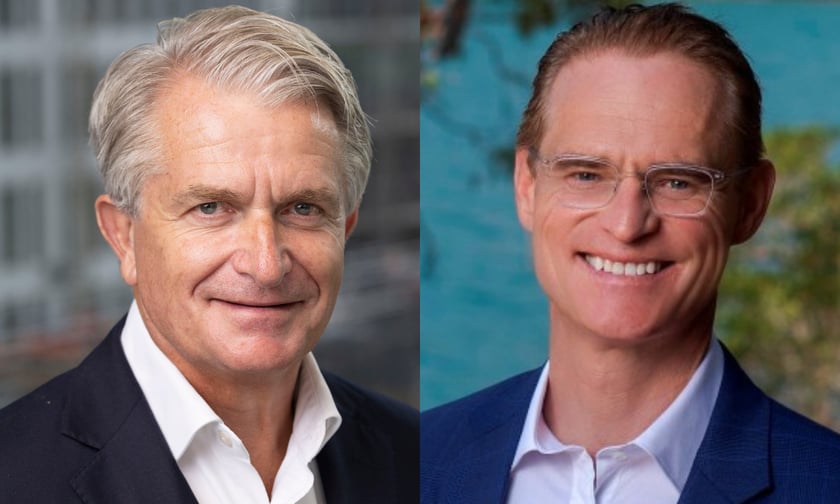

In July, HDI Global SE (HDI) announced the opening of a new office in Dubai. HDI is a giant, worldwide commercial and specialty lines insurer, traditionally focused on Europe and headquartered in Hannover. This German city is closer to the United Arab Emirates (UAE) than Sydney and yet the Dubai announcement was made from the NSW capital.
HDI executives told Insurance Business that Dubai’s Sydney orientation is part of HDI’s wider strategy to evolve into a more globally focused insurer.
The new office in the Middle East is overseen by Stefan Feldmann (pictured right), head of HDI Global Asia-Pacific. Feldmann runs HDI’s operation across Asia-Pacific, including in Australia, New Zealand, Singapore and Hong Kong.
Willem van Wyk (pictured left), is senior executive officer of the firm’s new Dubai office. Van Wyk is a former Allianz CEO with more than two decades of insurance industry experience in the UAE and other Middle East and North Africa (MENA) countries. The vast MENA region encompasses nations as diverse as Saudi Arabia, Israel, Malta and Morocco.
Feldmann said the main reason HDI’s Australia operation is overseeing the Dubai expansion is because Australia has experience setting up new operations and a culture suited to new ventures.
For example, he said, HDI’s division Down Under supported the establishment of the firm’s Singapore operation and continues to oversee it.
“The board has recognized that we are in a good position to support these units with our expertise, mindset and proximity, so in collaboration with Singapore they felt we are better suited than if this was run out of the home office function [Hannover headquarters],” said Feldmann.
The new Dubai branch, he said, is an MGA of the Singapore operation. HDI has also made its Australia operation, said Feldmann, a referral desk for Dubai’s property and engineering projects because of the considerable size of its “authority levels.”
Van Wyk said the Dubai operation is a key part of HDI’s wider expansion plans across Asia. He said that operation is linked to Australia because that’s where a “growth mindset” was fostered by HDI’s board, with a focus on innovation and proactivity
“The culture that we created in Australia, I think, is quite unique,” he said.
He said this is part of HDI evolving into a strong global insurer to “better serve our markets”.
Van Wyk said HDI’s initial insurance focus areas in Dubai will be property, engineering and construction business.
“If you look at the growth and the investment that’s happening, not just here [in the UAE], but also across the region, and especially in Saudi Arabia and through its modernization program – there are a significant construction projects in the pipeline,” said van Wyk.
The Saudi Vision 2030 plan, according to news reports, is seeing hundreds of billions of dollars invested in megaprojects. One of the most emblematic and controversial is probably NEOM, a city and economic zone being built in the desert.
HDI has a long history as a specialist insurer of construction and engineering projects. In recent years, in Australia and across Asia-Pacific, the firm has also underwritten dozens of construction projects for renewables.
Van Wyk said considerable international capital is going into renewable energy projects across the UAE, Saudi Arabia and other parts of the region.
The Dubai Clean Energy Strategy, according to its website, aims to produce 75% of its energy requirements from clean sources by 2050. A recent National Geographic case study, The World’s Most Improbably Green City, found that Dubai is making some progress towards sustainability despite being heavily dependent on oil and gas exports.
However, the UAE pursues a policy of actively boosting both fossil fuel production and clean energy simultaneously and was caught making oil deals at last year’s COP28 Summit.
HDI pitches itself as an innovator in the renewables space with offerings that include advanced data analytics and climate modelling. It could help steer Dubai’s sustainability efforts.
Regardless, many economic leaders in the United States and Europe see enormous financial opportunities across this region.
“Economically, the growth rate here is solid and often higher than what we find in developed countries,” said Van Wyk.
With that growth, he sees considerable insurance opportunities. Over the next decade Van Wyk expects the region to grow in global importance as a reinsurance market.
He attributed this, in part, to the Dubai International Financial Centre (DIFC), a special economic free zone that acts as a financial hub, he said, for companies operating across the Middle East, Africa and South Asia.
“Our focus will be mostly on the Middle East business but the DIFC is becoming a real reinsurers’ hub for business beyond this as well,” said Van Wyk.
Are you part of an Australia-based insurance operation with business in MENA countries? Tell us what you’re up to below
